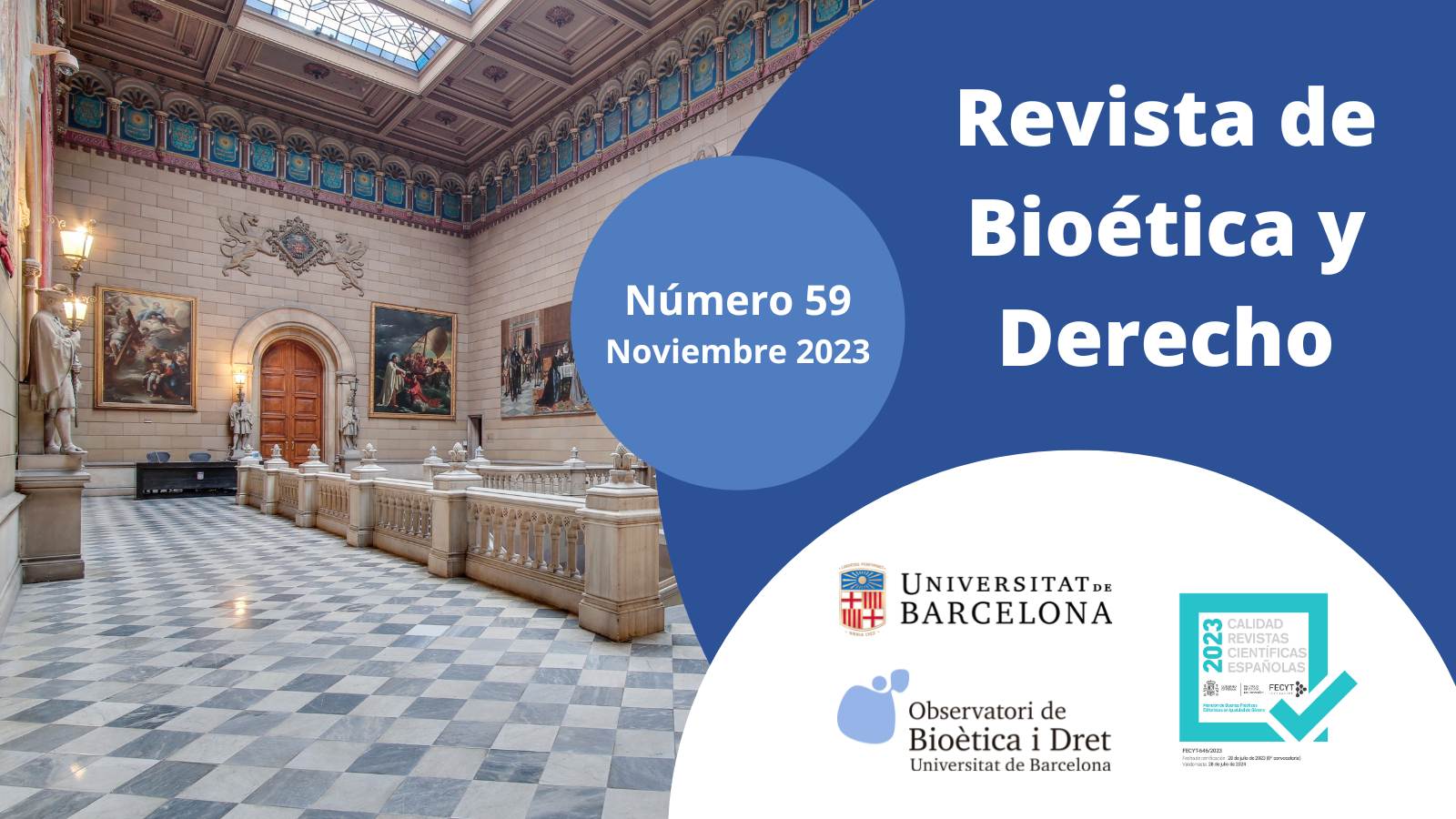How do Act 8/2021 and Act 6/2022 affect biomedical research carried out in Spain?
DOI:
https://doi.org/10.1344/rbd2023.59.41787Keywords:
disability, legal capacity, conservatorship, support measures, cognitive accesibilityAbstract
The implementation of the Convention on the Rights of Persons with Disabilities obliges the States Parties to carry out legal reforms that affect the norms that regulate the participation of persons with disabilities in clinical biomedical research, especially in clinical trials with drugs. In Spain, the Civil Code and the General Act on the Rights of Persons with Disabilities have had to be reformed to adapt the exercise of legal capacity and to guarantee cognitive accessibility. These reforms could serve as a model for reforms to be implemented in other countries.
References
Appelbaum PS, Lidz CW. The therapeutic misconception. The Oxford Textbook of Clinical Research Ethics. EJ Emanuel, C Grady, RA Crouch, RK Lie, FG Miller and D Wendler (eds). New York: Oxford University Press. 2008: 633-644.
Borsellino G et al. The regulation and governance of clinical trials: Past and present considerations to ensure ethical treatment of human participants. Journal of Law and Medicine. 2021; 28(2): 423-425.
Cuenca Gómez P. Los derechos fundamentales de las personas con discapacidad. Alcalá de Henares: Editorial Universidad de Alcalá. 2012.
De Asís Roig R. Sobre el sentido, contenido y configuración jurídica de la accesibilidad. Universitas. 2020, 32: 2-21. Acceso en línea [24 abril 2023]: https://doi.org/10.20318/universitas.2020.5509
Dworkin G. Paternalismo. En Derecho y Moral, J. Betegón y J.R. de Páramo (dirs.). Barcelona: Ariel. 1990: 147-161.
Foe G, Larson E. Reading level and comprehension of research consent forms: An integrative review. Journal of Empirical Research on Human Research. 2016; 11(1): 31-46.
Friesen P et al. IRBs and the protection-inclusion dilemma: Finding a balance. American Journal of Bioethics. 2022. DOI: 10.1080/15265161.2022.2063434.
Jiménez Cano R. Hacia un marco conceptual adecuado de la normativa española sobre personas con discapacidad. En Estudios sobre el impacto de la Convención Internacional sobre los derechos de personas con discapacidad en el ordenamiento jurídico español. P Cuenca (ed.). Madrid: Dykinson. 2010: 65-102.
Levine RJ. Clarifying the concepts of research ethics. The Hastings Center Report. 1972; 9(3): 21-26.
Levine RJ. Clinical trials and physicians as double agents. Yale Journal of Biology and Medicine. 1992; 65(2): 65-74.
Lindsley KA. Improving quality of the informed consent process: Developing an easy-to-read, multimodal, patient-centered format in a real-world setting. Patient Education and Counselling. 2019; 102: 944-951.
Lipworth W et al. The oversight of clinical innovation in a medical marketplace. En The Cambridge Handbook of Health Research Regulation. G Laurie, E Dove, A Ganguli-Mitra, E Postan, N Sethi, A Sorbie (eds). Cambrdige: Cambridge University Press. 2021: 287-295.
Mégret F. The disabilities convention: towards a holistic concept of rights. The International Journal of Human Rights. 2008; 12(2): 261-278.
Ouellette A. Bioethics and Disability. Towards a Disability-conscious Bioethics. New York: Cambridge University Press. 2011: 315.
Paasche-Orlow MK, Taylor HA, Brancati FL. Readability standards for informed-consent forms as compared with actual readability. New England Journal of Medicine. 2003; 348: 721-726.
Palacios A. El modelo social de discapacidad: orígenes, caracterización y plasmación en la Convención Internacional sobre los Derechos de las Personas con Discapacidad. Madrid: Cinca. 2008.
Ramiro Avilés MA. La acreditación de los comités de ética de la investigación. Gaceta Sanitaria. 2017; 31(1): 53-56.
Simón-Lorda P et al. El caso Willowbrook: ética, investigación y salud pública. Spanish Journal of Critical Bioethics. 2014; 1: 1-12.
Smart J. The power of models of disability. Journal of Rehabilitation. 2009; 75(2): 3-11.
Vivas Tesón I. La curatela como principal medida judicial de apoyo para el ejercicio de la capacidad jurídica: fundamento y claves de su nuevo régimen legal. En La reforma de la discapacidad, A Castro-Girona, C Pérez, F Cabello de Alba (coords.) Madrid: Fundación Notariado. 2023: 485-529.
Downloads
Published
How to Cite
Issue
Section
License
Copyright (c) 2023 Miguel Angel Ramiro Avilés

This work is licensed under a Creative Commons Attribution-NonCommercial-NoDerivatives 4.0 International License.
 The author retains the copyright and grants Revista de Bioética y Derecho the right of first publication of the article. All articles published in Revista de Bioética y Derecho are under Creative Commons licensing Recognition – Non Commercial – NoDerivedArtwork (by-nc-nd 4.0), which allows sharing the content with third parties, provided that they acknowledge its authorship, initial publication in this journal and the terms of the license. No commercial use of the original work or generation of derivative works is permitted.
The author retains the copyright and grants Revista de Bioética y Derecho the right of first publication of the article. All articles published in Revista de Bioética y Derecho are under Creative Commons licensing Recognition – Non Commercial – NoDerivedArtwork (by-nc-nd 4.0), which allows sharing the content with third parties, provided that they acknowledge its authorship, initial publication in this journal and the terms of the license. No commercial use of the original work or generation of derivative works is permitted.







